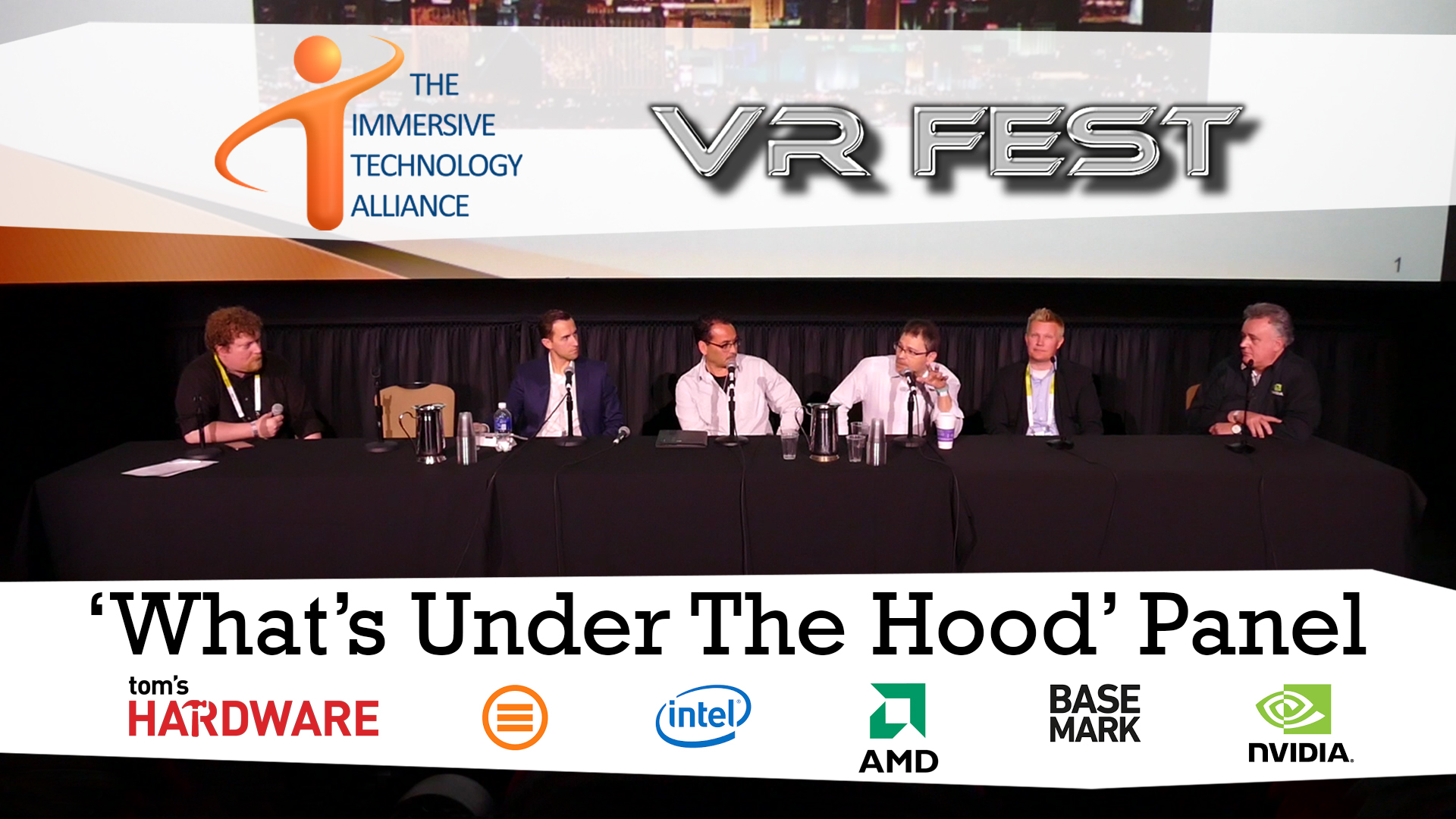AMD, Intel, Nvidia, Basemark, And Futuremark Talk VR At 'What's Under The Hood' Panel At VR Fest (Video)
As we’ve mentioned in a number of previous posts, Virtual Reality was everywhere at CES. In fact, it was so ubiquitous that there was a separate off-site mini-conference called VR Fest that took place at the Palms Casino Resort at the same time as CES. Part of the VR Fest activities included a series of panel talks presented by the ITA's VR Council.
Back in the fall of 2015, Tom’s Hardware was privileged to moderate the 'What’s Under the Hood' panel at the ITA's Immersed 2015 Conference, and we were asked again to moderate a panel on the same topic at VR Fest.
The moderator duties fell to me, and joining me on this version of the panel were representatives from all three major CPU and GPU vendors, AMD, Intel, and Nvidia. To have all three on the same panel discussing VR was quite a coup for the ITA, and also, both Basemark and Futuremark were present. Both of those companies are leading the way when it comes to measuring and evaluating VR solutions with their VR benchmarking tools.
Going left to right, the panelist were Ryan McCall, Director of Sales and Business Development, Futuremark; Frank Soqui, General Manager Enthusiast Desktop Group, Intel; Daryl Sartain, Director of VR, Radeon Technology Group and AMD and VR Council Chair (who we also interviewed separately at CES); Tero Sarkkinen, CEO, Basemark; and Neil Trevett, VP Mobile Ecosystem, Nvidia and President of the Khronos Group (creators of the OpenGL and Vulkan graphics APIs). As you can see, it was quite a distinguished panel to have talking about Virtual Reality for 30 minutes.
We don’t want to spoil the content of the video for you, which is long but well worth a watch if you want to hear some in-depth insight into the state of VR today from these experts. However, just to whet your appetite, some of the topics discussed are the announcement of the Oculus Rift’s price and how it may impact the GPU vendors like AMD and Nvidia, and Intel’s thoughts on VR and whether Skull Canyon could be made into a mini VR-box. We also talked with about the challenge of benchmarking VR and how companies like Basemark and Futuremark have to measure different kinds of VR experiences (360-video vs. full-on VR gaming), and finally, how new APIs like DirectX 12 and Vulkan are going to impact VR.
After speaking to all the panelists, it looks like 2016 is going to be a very exciting year for them, with VR presenting both new opportunities and new challenges. We looking forward to keeping you abreast of any and all future developments in the VR space – 2016, the "Year of VR," is only the beginning.
Alex Davies is an Associate Contributing Writer for Tom's Hardware and Tom's IT Pro, covering Smartphones, Tablets, and Virtual Reality. You can follow him on Twitter. Follow Tom's Hardware on Twitter, Facebook, and Google+.
Get Tom's Hardware's best news and in-depth reviews, straight to your inbox.
-
bit_user Thanks for posting.Reply
I don't know who said desktop systems need to be more powerful than consoles because they have more "overhead". This just isn't true. Since they're a fixed hardware spec, consoles get away with being weaker because developers can tune the games optimally, for them. That, and PC games tend to be more cutting edge. Plus, PC users tend to do things like running higher-res displays and cranking up the quality settings beyond what the consoles use.
Neil Trevett was exactly right, when he said mobile is limited by heat (and battery?). Desktops will be the VR platform of choice, for the foreseeable future. Not only because they can run much more powerful CPUs and GPUs, but also because it'd be a pain to lug around all the accessories (cameras, lighthouses, controllers, HMD, etc.) you need for the best VR experience. Eventually, AR (or using AR hardware for VR) might largely displace VR. But that'll be a while.
-
Kewlx25 Reply17435647 said:Thanks for posting.
I don't know who said desktop systems need to be more powerful than consoles because they have more "overhead". This just isn't true. Since they're a fixed hardware spec, consoles get away with being weaker because developers can tune the games optimally, for them. That, and PC games tend to be more cutting edge. Plus, PC users tend to do things like running higher-res displays and cranking up the quality settings beyond what the consoles use.
Neil Trevett was exactly right, when he said mobile is limited by heat (and battery?). Desktops will be the VR platform of choice, for the foreseeable future. Not only because they can run much more powerful CPUs and GPUs, but also because it'd be a pain to lug around all the accessories (cameras, lighthouses, controllers, HMD, etc.) you need for the best VR experience. Eventually, AR (or using AR hardware for VR) might largely displace VR. But that'll be a while.
It is true. With consoles, the games talk directly to the hardware with kernel level like control. This is a security risk they're willing to take. On the PC, you don't let user mode application talk directly to the hardware unless the hardware supports protected mode like the CPU.
Vulkan and DX12 will be much closer to the hardware, but still not as close as consoles.
